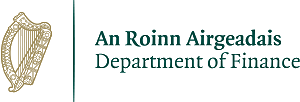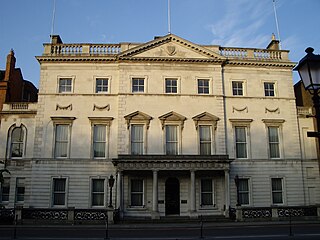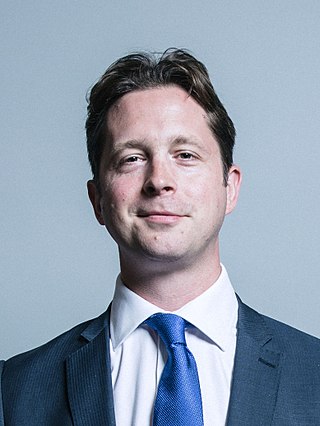Related Research Articles
In the United Kingdom, non-departmental public body (NDPB) is a classification applied by the Cabinet Office, Treasury, the Scottish Government, and the Northern Ireland Executive to public sector organisations that have a role in the process of national government but are not part of a government department. NDPBs carry out their work largely independently from ministers and are accountable to the public through Parliament; however, ministers are responsible for the independence, effectiveness, and efficiency of non-departmental public bodies in their portfolio.
The Northern Ireland Executive is the devolved government of Northern Ireland, an administrative branch of the legislature – the Northern Ireland Assembly. It is answerable to the assembly and was initially established according to the terms of the Northern Ireland Act 1998, which followed the Good Friday Agreement. The executive is referred to in the legislation as the Executive Committee of the assembly and is an example of consociationalist ("power-sharing") government.
The North/South Ministerial Council (NSMC) is a body established under the Good Friday Agreement to co-ordinate activity and exercise certain governmental powers across the whole island of Ireland.

David George Hanson, Baron Hanson of Flint, is a British Labour Party politician who has served as a minister of state in the Home Office since July 2024. He previously served as the member of Parliament (MP) for Delyn from 1992 to 2019. He held several ministerial offices in the Blair and Brown governments, serving in the Home Office, the Ministry of Justice, the Wales Office, the Northern Ireland Office and the Whips' Office. Hanson sat on Ed Miliband's opposition front bench as a shadow treasury minister, and later the shadow immigration minister.

The Department of Finance is a department of the Government of Ireland. It is led by the Minister for Finance.

The Department of Foreign Affairs (DFA) is a department of the Government of Ireland that is responsible for promoting the interests of Ireland in the European Union and the wider world. The head of the department is the Minister for Foreign Affairs.

The Department of Justice is a department of the Government of Ireland. It is led by the Minister for Justice. The department's mission is to maintain and enhance community security and to promote a fairer society in Ireland.

The Department of Education is a department of the Government of Ireland. It is led by the Minister for Education.
The Judicial Appointments Commission (JAC) is an independent commission that selects candidates for judicial office in courts and tribunals in England and Wales and for some tribunals whose jurisdiction extends to Scotland or Northern Ireland.

The Northern Ireland Civil Service is the permanent bureaucracy of employees that supports the Northern Ireland Executive, the devolved government of Northern Ireland.

The Ministry of Justice (MoJ) is a ministerial department of the Government of the United Kingdom. It is headed by the Secretary of State for Justice and Lord Chancellor. Its stated priorities are to reduce re-offending and protect the public, to provide access to justice, to increase confidence in the justice system, and to uphold people's civil liberties. The Secretary of State is the minister responsible to Parliament for the judiciary, the court system, prisons, and probation in England and Wales, with some additional UK-wide responsibilities, e.g., the UK Supreme Court and judicial appointments by the Crown. The department is also responsible for areas of constitutional policy not transferred in 2010 to the Deputy Prime Minister, human rights law, and information rights law across the UK.
Peace Commissioner is an honorary position in Ireland with special powers to make statutory declarations and witness signatures on documents under various Acts of the Oireachtas.

The First Minister and deputy First Minister of Northern Ireland are the joint heads of government of Northern Ireland, leading the Northern Ireland Executive and with overall responsibility for the running of the Executive Office. Despite the titles of the two offices, the two positions have the same governmental power, resulting in a duumvirate; the deputy First Minister, customarily spelled with a lowercase d, is not subordinate to the First Minister. Created under the terms of the 1998 Good Friday Agreement, both were initially nominated and appointed by members of the Northern Ireland Assembly on a joint ticket by a cross-community vote, under consociational principles. That process was changed following the 2006 St Andrews Agreement, such that the First Minister now is nominated by the largest party overall, and the deputy First Minister is nominated by the largest party from the next largest community block.

The Ministerial Code is a document setting out "rules" and standards for government ministers in the United Kingdom. Separate codes exist for ministers of the Scottish Government, the Northern Ireland Executive and the Welsh Government.
The Commissioner for Public Appointments is a British public servant, appointed by the King, whose primary role is to provide independent assurance that ministerial public appointments across the United Kingdom by HM Government Ministers are made in accordance with the Principles of Public Appointments and the Cabinet Office's Governance Code on Public Appointments. The commissioner issues an annual report and a statistical bulletin each year.
The commissioner for ethical standards in public life in Scotland is an independent commissioner in Scotland with the responsibility for investigating complaints about Members of the Scottish Parliament, councillors of the 32 Councils of Scotland, and board members of Scottish public bodies. The commissioner also monitors the appointment of members of specified public bodies in Scotland by the Scottish Ministers.

Michael Alex Burghart is a British Conservative politician, academic and former teacher who has served as Member of Parliament (MP) for Brentwood and Ongar since 2017. He was formerly a special adviser to Theresa May and has served as Shadow Secretary of State for Northern Ireland since July 2024.
There have been three governments of the 33rd Dáil to date, being coalition governments of Fianna Fáil, Fine Gael and the Green Party. This followed the 2020 general election to Dáil Éireann held on 8 February, and negotiations on a programme for government that lasted till June. The parties agreed on a rotation, with the two major party leaders alternating as Taoiseach. The makeup of the parties resulted in a centrist coalition. It was the first time that Fianna Fáil and Fine Gael have participated in the same government, which Leo Varadkar described as the end of what has often been referred to as Civil War politics.
The Minister of State at the Department of Health is a junior ministerial post in the Department of Health of the Government of Ireland who may perform functions delegated by the Minister for Health. A Minister of State does not hold cabinet rank.
References
- 1 2 Commissioner for Public Appointments for Northern Ireland (31 December 2016). "Code of Practice for Ministerial Public Appointments in Northern Ireland" (PDF).
- ↑ "Commissioner's Biography". Commissioner for Public Appointments for Northern Ireland. 2 December 2015. Retrieved 9 July 2024.